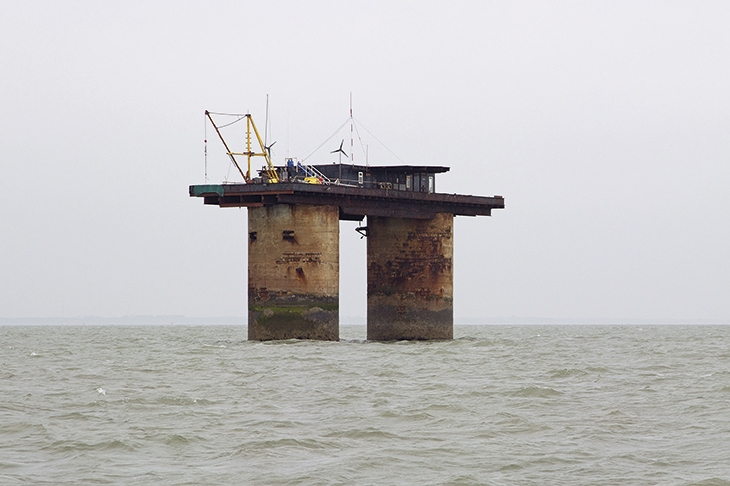In 2012, the editors of Vice ran an article aimed at would-be contributors to their self-avowedly edgy magazine headed ‘Never Pitch Any of These Things to Us Again’. Among a list of no-nos that included burlesque dancing and art made of bodily fluids was the principality of Sealand. They wrote:
OK, so an independent sovereign state floating just outside the UK sounds great, right? Except, well it’s not really, is it? I mean, it’s not an independent sovereign state like, say, France. It’s more like a big, floating turd of mental illness in the North Sea.
Unsurprisingly, Dylan Taylor-Lehman, the American author of this doggedly respectful account of how an abandoned, rusting former second world war naval fort in the North Sea became ‘the world’s most stubborn micronation’, hardly subscribes to this point of view. A 12-page appendix is supplied to support Sealand’s legal claim to a France-like stateness.
Sealand’s trappings of nationhood include a constitution, anthem, flag, stamps and passports
Yet both turds and madness do put in appearances here. The author believes that those islands covered in seagulls’ droppings which were seized by ‘turd-harvesting’ colonists following the passing of the United States Guano Island Act of 1856 can be seen as historical forebears of Sealand. ‘Navy grunts’, meanwhile, who had the misfortune to be stationed on what UK government officials still scrupulously refer to as ‘Roughs Tower’ during the war, frequently suffered ‘fort madness’. ‘At least one soldier,’ we are told, ‘jumped to his death in despair, preferring to drown in the North Sea than stay another moment on the fort.’
Insanity, it appears, was therefore baked in at the start, and present long before the retired army major and self-described self-made millionaire Patrick ‘Paddy’ Roy Bates, in the heyday of the pirates, ousted a crew from Radio Caroline to take possession of the fort for his own rival radio station in 1967. The hare-brained scheme to declare this decaying concrete hulk, then lying ‘unambiguously’ outside Britain’s territorial waters, an independent principality was dreamt up in a pub, and initially seem to have been a bit of a ruse to get around such legislation as the new UK Marine Broadcasting (Offences) Act.
But Bates won one legal battle, and saw off more than a few attempts to evict him and his family from the fort. Sealand, as it was named, began to acquire the trappings of nationhood — with its own constitution, anthem and motto E Mare Libertas (‘From the Sea, Freedom’), a flag, stamps and passports. In 1972 it issued its first coins, and seven years later hosted its first wedding. An invitation was apparently extended to the newly elected prime minister Margaret Thatcher, but she proved a no-show.
Much madness duly ensued in the subsequent decades. From the appearance of a Sealand passport in the murder investigation of the Italian fashion designer Gianni Versace to the country’s brief role as an internet data haven for a band of black-clad American cyber-libertarians, Taylor-Lehman relates the good, the bad and the ridiculous with a mostly straight face and with plenty of input from the Bates family. The longtime regent and current ruler, Prince Michael, provides some of the pithiest lines, describing his late father as ‘an unstoppable nutter’, and self-deprecatingly summarising the whole enterprise as largely one of ‘blood, sweat, tears and wages, fuel and generators’.
There are nevertheless nastier elements here. In 1978 Sealand was subjected to a coup by some of the principality’s more mercenary (in all senses of the word) German and Dutch business associates. Shadowy descendants of this thwarted venture continue to lay claim to the territory and operate a government in exile with links to some decidedly unsavoury, not to say anti-Semitic, groups — which, given the fort’s origins as a defence against Luftwaffe bombing raids and Sealand’s founder’s distinguished service in the second world war, the Bateses regardas more than a bleeding liberty.
Taylor-Lehman points out that Bates Snr was born in Ealing, home to the film studio responsible for Passport to Pimlico. With its declaration of independence, its dubious foreign emissaries, rackety offshore business ventures and tussles with men from the ministry, the story of Sealand certainly shares some similarities with that rather genteel 1949 film — though it’s hard to picture Stanley Holloway defending his turf from intruders with petrol bombs and pistols, as Bates and his then teenage offspring often did.
But the Bateses seem fundamentally more Essex than Ealing or Pimlico. Rough Diamond Roy, with his endless get-rich schemes, and his wife Princess Joan, a sometime model, lived most of their onshore lives in and around Southend, on the Thames estuary. That continues to be the clan’s base, and their more reliable business interests are in cockling — though the internet now ensures that Sealand does a brisker trade in titles and merchandising than was ever possible in Roy’s day.
But Taylor-Lehman also mentions that this is an area with a proud heritage of non-conformity, and he sees Sealand in the continuum of such experimental communities as the Land Colony at Hadleigh — though it seems to me more in the spirit of the plot land settlements of Canvey Island, where dreams of autonomous self-sufficiency were pursued in converted railway carriages on strips of unwanted marshland. Film rights have, apparently, been sold many times over, yet nothing has come of it, and a reality TV show also failed to get beyond a pilot. Which seems rather a pity, because there’s a kind of tooled-up TOWIE crying out to be made here.






Comments